Lin Wilder's Blog, page 14
June 24, 2023
Kill the Monster: The Paradox of Completion
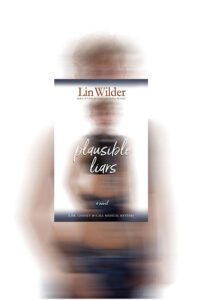
Finishing anything always involves paradox.
Okay, but kill the monster?
A strange phrase to use when completing a long project- one that has taken years to finish…like a book. Especially this book!
Or is it? I’m a writer but the paradox is not limited to writing; instead, it applies to all big, long-term projects. Graduating from college, achieving a long sought after goal, like a promotion, raise, or public recognition of your specific talent; that strange paradox exists in each and every one.
There’s a curious sense of …”it’s done-what now?”
I return to Winston Churchhill’s words each time one of the books is done. His phrasing, so appropriately and splendidly describes these paradoxical feelings:
Writing a book is an adventure. To begin with it is a toy and an amusement. Then it becomes a mistress, then it becomes a master, then it becomes a tyrant. The last phase is that just as you are about to be reconciled to your servitude, you kill the monster and fling him to the public.
We forget. At least I do, that the joy is in the adventure. Always. Never in the finish. Always the paradox. One which I need to revisit each time, one would think we’d remember but we don’t. Which, of course begs the question, why is that exactly?
The answer lies in Churchill’s first sentence and last phase, “….an adventure…just as you are about to be reconciled to your servitude, you kill the monster and fling it to the public.” The process of writing is jam packed with “Yes!!”
And Nooooo!!!
The ups and downs of anything requiring persistence, patience and for me, waiting for the words.
Kill the monster: the paradox of completion.
Returning to Kate and Lindsey along withthe cast of characters in the Lindsey McCall medical mystery series felt like returning to family members I’d not seen for a very long time. And of course, picturing their red Dobie boy Max and his pal Gus, who looks just like Seymour, running in the woods, made my heart soar. Returning to Morgan Garder, the autistic savant?
Pure pleasure.
But this crisis facing investigative reporter Kate Townsend and Lindsey took a sizeable bite out of my gut.
In the Foreward of Plausible, I wrote this:
Nothing I’ve ever written has been as brutally taxing as this story. There are hundreds of reasons for that fact, but I’ve come to understand the primary one is fear.
I didn’t come to fiction until I’d had decades of experience with writing and publishing non-fiction.
The two are worlds apart. While writing is always taxing work—the neverending search for clarity and coherence, nonfiction requires far less from the author than fiction. Because we writers of fiction have a responsibility when creating a character: he or she must be sitting beside us as we read the story. If she isn’t, we haven’t done our job.
Therefore writing Dr. T’s character forced a plunge into places I had no interest in going. A person like her would not have come into this beautiful world looking for a kid to control, manipulate, or seduce. There had to be a reason that created massive wounds in her psyche.
Writing this story reminds me of my friend Rebecca’s remarks on why we write. She and I had been asked to do a reading from one of our books. She grabbed the lecturn and said,
“Our stories force us to confront characters we may prefer not to know. The nuances of a personality that is both heroic and cowardly; brilliant and inept; noble and wretched.
Our research takes us to far-flung places as we grapple with the complexities of new stories and protagonists.”
Indeed Rebecca, indeed.
The book will be released inthe next six to eight weeks. First, we need to run the manuscript though editing and proofing. Then design.
Once the advanced review copy is done, I’ll send it out for three reviews.
So release late summer.
What next?
Back to the ancient world with a story about the early life of King David: One Smooth Stone.
The post Kill the Monster: The Paradox of Completion appeared first on Lin Wilder.
June 17, 2023
The Book of Samuel as Mirror of Us: Today
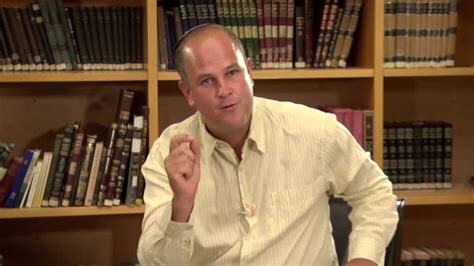
You’ve guessed this photograph isn’t of the prophet Samuel. It’s an image of a man named Dr. Micah Goodman. Native Israeli philosopher and writer Goodman has the ear of Israeli leaders, and since discovering him, mine. Once I listened to Dr. Goodman’s first of five online lectures on Samuel, I discarded the partially written article I’d intended for today to write this one.
His talk, The Book of Samuel: Religion, Politics, and the Longing for Order is, in a word, riveting.
Dr. Goodman never suggests in his forty-five-minute talk that what takes place in the Book of Samuel has any relevance to our 21st century either in the US or in Israel. But as I listened to Goodman reflect upon ancient Israel’s adherence to ritual while disregarding the Lord and His Law, I could not help thinking of us. Today.
And when he spoke of the Ark as a talisman for the salvation of Israel from their suffering and death, the parallels became impossible to ignore.
Even if much of the Book of Samuel is a distant memory-or unknown, Hannah’s heartfelt prayer to her God to end her barrenness is a familiar one:
“The priest Eli was on duty at the entrance to God’s Temple in the customary seat. Crushed in soul, Hannah prayed to God and cried and cried—inconsolably. Then she made a vow:
Oh, God-of-the-Angel-Armies,
If you’ll take a good, hard look at my pain,
If you’ll quit neglecting me and go into action for me
By giving me a son,
I’ll give him completely, unreservedly to you.
I’ll set him apart for a life of holy discipline.
12-14 It so happened that as she continued in prayer before God, Eli was watching her closely. Hannah was praying in her heart, silently. Her lips moved, but no sound was heard. Eli jumped to the conclusion that she was drunk. He approached her and said, “You’re drunk! How long do you plan to keep this up? Sober up, woman!”
15-16 Hannah said, “Oh no, sir—please! I’m a woman brokenhearted. I haven’t been drinking. Not a drop of wine or beer. The only thing I’ve been pouring out is my heart, pouring it out to God. Don’t for a minute think I’m a bad woman. It’s because I’m so desperately unhappy and in such pain that I’ve stayed here so long.”
The priest’s response to Hannah is puzzling.
At least that was my thought each time I read it until listening to Dr. Goodman.
To him, the priest Eli’s response to Hannah’s plea to her God is emblematic of Israeli sin: In Goodman’s words, religion vs religiousity. He means by that distinction: religion as narrow, rigid and focused on ritual, not God. Nor ethics nor the other.
While religiousity is spontaneous heart-felt prayer. Just like Hannah’s was. In his distinction, Dr. Goodman refers to Martin Buber, whose Jewish theology cames so close to Christianity that the distinction between the two fade almost completely.
For me, a major attraction to Judaism and Catholicism is precisely our ritual, rules and dogma. And the word “religiousity” is off-putting because it sounds like the very thing Goodman says it’s not. Therefore I’m intrigued.
Because we don’t need to be historians to understand and fear the consequences of our love affair with ritual and it’s objects.
And so, as I’ve pondered Dr. Goodman’s first talk, Pope Francis’s controversial remarks and limitations on the Tridentine Mass have become much clearer. In a real sense, the Pope is talking precisely about the same thing as Goodman: religion vs religiousity.
In this first of a series of five talks on the Book of Samuel by Dr. Goodman, I listened-carefully. Because Goodman’s Isreali accent ican be challenging. I write next about a small portion of his provocative meditation.
Being human means to live in radical uncertaintyThe Philiistines were the enemies of ancient Israel. Even the Philistines knew the power of the Israeli Lord who lived in the Ark. And so, when the Philistines caused horrendous casualties to the Israelis, the elders looked to the Ark as a solution.
Let’s fetch the ark of the covenant of Adonai from Shiloh that He may come among us and deliver us from the hand of our enemies.” 4 So the people sent to Shiloh, and from there they carried the ark of the covenant of Adonai-Tzva’ot who sits above the cheruvim. Eli’s two sons, Hophni and Phinehas, were there with the ark of the covenant of God. 5 Now when the ark of the covenant of Adonai entered the camp, all Israel shouted with a great shout, so that the ground resounded.
6 When the Philistines heard the noise of the shout, they wondered, “What’s this noise of a great shout in the camp of the Hebrews?” When they realized that the ark of Adonai had come into the camp, 7 the Philistines were afraid, for they said, “God has come into the camp.” So they said, “Woe to us!
“We can never see what’s before us, “Goodman says. We live in radical uncertainty because anything can happen at any time. But when religion promises certainty through performance of ritual, it becomes magic.”
The Ark had become magic, a symbol empty of obedience to the God of Israel. And the Philistines defeated Israel and took possession of the Ark.
It’s impossible for me to think this a tale about ancient people and ancient priests. Instead, these words feel relevant now. The Book of Samuel as Mirror of Us: Today.
Maybe that’s because my reading of the Old Testament usually feels as if I’m looking in a mirror.
Or it could be that I’ve read one too many of Johathan Cahn’s books about America as the new Israel.
Or more likely, it’s that I see us, our leaders, and even our priests behaving as if we’re above the commandments-as if they are no longer relevant to our “advanced culture:”
….Jesus shows that the commandments must not be understood as a minimum limit not to be gone beyond, but rather as a path involving a moral and spiritual journey towards perfection, at the heart of which is love….those who are impelled by love and walk by the Spirit (Gal5:16) …feel an interior urge-a genuine necessity and no longer a form of coercion-not to stop at the minimum demands of the Law, but to live them in their fullness…..St Paul ll
The post The Book of Samuel as Mirror of Us: Today appeared first on Lin Wilder.
June 10, 2023
Wonder: Our Only Fitting Attitude
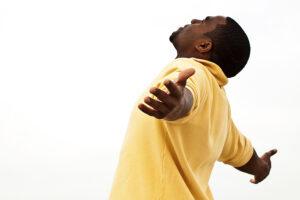
African American man with open ams. Worship.
Wonder: Our only fitting attitudeIn the era of instant everythng, have we lost our capacity for awe? With too much time, food and vast varieties of entertainment a finger tap away, dark and dangerous can look exciting and adventurous. And boredom can drive the more vulnerable among us to drug induced highs.
With another tap of the finger or simply askng our miniature cellular AI, we believe all our questions can be answered.
I understand the absence of wonder.
There was a time when I had this memorized, the words represented truth to my twenty-something atheist’s heart, immersed and lost in the sea of the thoughts of others.
Most of the big shore places were closed now and there were hardly any lights except the shadowy, moving glow of a ferryboat across the Sound. And as the moon rose higher the inessential houses began to melt away until gradually I became aware of the old island here that flowered once for Dutch sailors’ eyes—a fresh, green breast of the new world. Its vanished trees, the trees that had made way for Gatsby’s house, had once pandered in whispers to the last and greatest of all human dreams; for a transitory enchanted moment man must have held his breath in the presence of this continent, compelled into an æsthetic contemplation he neither understood nor desired, face to face for the last time in history with something commensurate to his capacity for wonder…
That’s what can happen when we immerse ourselves in the thoughts of others: we get lost.
It’s funny because a few years ago, I reread the book I so loved back then, The Great Gatsby.
Only to wonder why I’d loved it so. Disagreeing heartily with a writer who insists we should return to Daisy, Nick and Gatsby.
With ease I can return to the young girl I once was,hungry to learn from those I believed to have the answers; to have asked all of the questions that swarmed in my mind. The yearning for truth and wisdom beckoned. I never doubted that they lay dormant within some professor or author or advanced degree…or maybe even in a sacred place somewhere.
Only after a few more decades and three advanced degrees did I comprehend that wisdom doesn’t line the walls aof academia. And learn that wise academic faculty members are rare, even precious. I was exceptionally fortunate to encounter three: two in undergraduate and one in my doctoral program.
As I re-read the words many years later, again I am drawn by the lyrical, lush-almost profligate beauty of Fitzgerald’s prose but profoundly aware of the despair implicit in his words. Fitzgerald’s America of 1925 was similar to our own: cynical, nihilistic, war weary and fearful of plague.
And as I sat there, brooding on the old unknown world, I thought of Gatsby’s wonder when he first picked out the green light at the end of Daisy’s dock. He had come a long way to this blue lawn and his dream must have seemed so close that he could hardly fail to grasp it. He did not know that it was already behind him, somewhere back in that vast obscurity beyond the city, where the dark fields of the republic rolled on under the night.
Gatsby believed in the green light, the orgastic future that year by year recedes before us. It eluded us then, but that’s no matter—tomorrow we will run faster, stretch out our arms farther. . . . And one fine morning——
So we beat on, boats against the current, borne back ceaselessly into the past
Boring and self-indulgentwere my several decade later reactions to the characters of The Great Gatsby who’d so enthralled me so many years ago. True despite the still lyrically beautiful Fitzgerald prose.
Why?
Because I believe the words, wonder: our only fitting attitude to everything.
Why, because of faith?
Actually, no. Because during those dangerous days in college, I decided that happiness is a decision, not a feeling. For me that meant a number of things. But primarily, it was that happiness, or the lack of it, resided in me. Not another.
If I was unhappy about something, it was up to me to change whatever the thing was. But if I was unable or unwilling to change it, “screw my brain around” and be happy in the situation. Because happiness was dependent on only one thing: my attitude about whatever was happening to me or around me. Or at least, avoiding unhappiness.
Only later did I learn that this is axiomatic of the stoic.
But there’s more, and it has to do with wonder.
Because we’ve been trained in the mechanistic views of the so-called “enlightment,” we don’t see.
We’re blinded.
When we sense wonder, we know it’s Other,
“Bishop Barron said the “fundamental problem” is not science, but rather scientism, or “the reduction of all knowledge to the scientific form of knowledge.”
But scientism cannot address questions of beauty, morality or transcendence, which become “meaningless” when reduced to scientific facts, the bishop said.”
Amen?
it’s different from the happiness that’s rooted in discipline and self-control. Wonder-awe-sweeps over us, almost like a massive wave that engulfs us in itself. Those feelings of wonder at a sunrise or a brand new baby, or listening to Mahler’s Resurrection Symphony.
We can make wonder habit by refusing the lure of the ubiquious phone to look around us. And stay awake so we’ll not miss the miracles that appear before us almost constantly.
And stop our internal and verbal chatter.
Invariably we’re led to gratitude for the sheer immensity and majesty of this world we’ve been given.
Aware that’s all gift. Everything: our lives, our careers, our friends, children and family. The air we breathe and water we drink.
The problems we’ve solved, like my decision about happiness: all gift.
And then gratitude leads us straight to faith then joy.
Below is the first of five videos that reveal the proper wonder to creation, creatures. Wonder: The Harmony of Faith and Science.
And corrects our childish beliefs that we understand- anything.
Julian of NorwichThe greatest honor we can give Almighty God is to live gladly because of the knowledge of his love.
And then gratitude leads us straight to faith.Wonder: Our only fitting attitude
The post Wonder: Our Only Fitting Attitude appeared first on Lin Wilder.
June 3, 2023
The Rosary of Our Lady
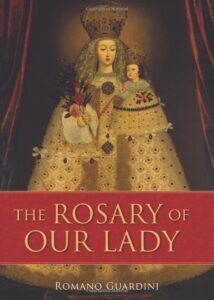
The rosary of Our Lady
was a favored book of two popes. Therefore I ordered it and put away for future reading. And forgot about it.
Until this week. This week where Monday was the Feast of Our Lady Mother of the Church and Wednesday, the Feast of the Visitation.
Isn’t it cool when forgotten books leap into our hands and then plunge into our hearts and souls? We can’t say that about many books, of course, only those rare texts so replete with devotion and reverence that we can have no doubt that the authors’ inspiration is the Holy Spirit.
That’s what reading these 145 pages on the rosary of Our Lady is like. One by one, Fr. Guardini takes the objections to the rosary and justifies them. Simply.
Like Jesus’ admonition against “praying like the Gentiles:” using so many words that they become meaningless. Then there are the objections against the repetition of the rosary that Guardini dispatches with ease.
And then Mary.
And finally brief, profound words on each mystery.
“The visitation…No woman has ever borne such gladness within her. But neither was any woman imprisoned in such silence. For how could she speak of the event so that the listener would believe her? Not even he to whom she was espoused for life understood….”
The Sorrowful mysteries:
“It is difficult to say anything about these mysteries. They deal with the wretchedness of humanity, and of the way the Lord accepted and bore this wretchedness. Their content is endless. We can extract only one point at a time…The last sorrowful mystery once more summarizes everything. Like the first, it is inexhaustible. We must approach it with open eyes and heart, examine what takes place and perservere-conscious that all this concerns our very selves.”
Mary
Most of us Catholics have encountered the prejudice against Our Lady felt by our Protestant friends. One that I find very surprising because Martin Luther had a deep love for the Mother of God.
In emphasizing her lowliness, Luther echoes Mary’s own words:
“For he has regarded the lowliness of his handmaid and all generations will call me blessed.”
Unfortunately, his words about the importance of distinguishing His creature Mary from the sovereign God have been deformed into something ugly, even evil.
Consequently, many of our Christian friends deny themselves the help, protection and solace of Theotokos, the name our Byzantine friends have for Mary. The mother we were given by the dying Jesus.
“Behold your mother.”
Guardini writes:
Jesus is the substance of Mary’s life…He is also her Redeemer…speaking of another child and its mother in such a manner…borders on blasphemy. Not only was Mary’s existence as a human mother achieved in her relation to Jesus but also her redemption. Becoming a mother, she became a Christian. By living with her Child, she lived with the lving God whose living revelation He is…
For this reason, Mary is not only a great Christian, one among a number of saints, but she is unique. No one is like her because what happened to her happened to no other human being. Herein lies the authentic root of all exaggeration about her….The Rosary of Our Lady
Somewhere in the book, Guardini compares praying the rosary with the stations of the cross. The stations, writes Guradini, are a journey. The rosary is a place.
During those decades when we’re given the grace to immerse ourselves in the words, we know precisely what he means.
Romano Guardini
was the subject of a doctoral dissertation Pope Francis never completed. But Pope Francis has been greatly influenced by the theolgian.
Remember Laudato Si? The encyclical that excited the media and offend many Catholics because Pope Francis had joined the religion of climate change?
Only because a friend and former Catholic said the Pope was expressing Communist ideas did I read it.
After reading it I was puzzled by the outrage, suspecting that the complainers, like my friend, never read it, they just passed on someone else’s opinion.
But then, these are the days of us vs them, any excuse works.
I include the encyclical here, because Bishop Robert Barron sees Romono Guardini’s philosophy throughout the encyclical. Bishop Barron ends his fine piece on the encyclical and Guardini with this observation:
“What strikes the Pope as self-evident is that the nature we have attempted to dominate, for the past several centuries, has now turned on us, like Frankenstein’s monster. As he put it in a recent press conference, “God always forgives; human beings sometimes forgive; but when nature is mistreated, she never forgives.” These lessons, which he learned many years ago from Romano Guardini, are still worthy of careful attention today.”
Guardini was also the “intellectual companion” of Pope Benedict. But that’s a subject for another article, so close was their relationship.
I “met” Guardini several years ago through a slow and careful read of his book, The Lord. Intending to read the book for the Lent of 2016, it took me over six months. Not because it’s difficult reading, Quite the contrary, it’s just like The Rosary of Our Lady: jam-packed with prose that is so affective, it’s close to poetry. But it’s 650 pages, not 145.
My fictional Pilate was inspired by Guardini’s “scandal of the cross:”
…Was this the riot that Caiaphas and Annas had feared for the past five years? These people are not just from Jerusalem. I hear Coptic, Syriac, Germanic, Aramaic, as well as Hebrew… and their voices sound joyous. This is no mob–these people are carrying on as if welcoming a hero or king!
As I watched, the crowd threw palm fronds and poplar branches onto the street in front of them, as if to form a carpet. As Longinus and I walked cautiously into the throng, no one even noticed us—we were invisible. Everyone’s attention was on a figure approaching on a horse. No, not a horse—something smaller. As the figure and beast grew larger, I could see that this was Jesus, the man about whom Caiaphas and Annas had been increasingly frantic.
Before I could get a clear view of him, he turned his mount left toward the temple. Without thinking, I started to follow, until Longinus put his hand on my arm. He and I locked eyes for a moment as I marveled at the energy in the air;
Their awe and joy were tangible as if they were connected in some mysterious way to the man who I now saw was riding a donkey colt! Amidst the cacophony of languages, I could hear alleluias and the hosannas, as if this man was a god.
Hosanna!
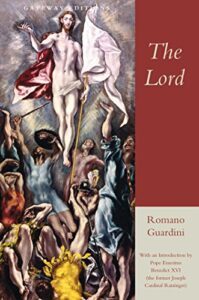
The post The Rosary of Our Lady appeared first on Lin Wilder.
May 28, 2023
Schedules, Deadlines and Prayer: What Do They Have in Common?
 Blue hourglass business background concept for deadline, urgency and countdownSchedules, Deadlines and Prayer: What Do They Have in Common?
Blue hourglass business background concept for deadline, urgency and countdownSchedules, Deadlines and Prayer: What Do They Have in Common?Time.
Whether it’s a meeting, task or appointment, schedules are part of our lives. Deadlines? Maybe not so much unless we’re working on a project, one that’s required extensive time and energy like writing a book. I use deadlines all the time simply because they give me the incentive I need to write.
Okay, but prayer? Schedules, deadlines and prayer?
Before I began to pray the Liturgy of the Hours, not infrequently, I’d get to the end of the day and realize I’d been so engrossed in whatever task I was working on that I never prayed. I was too busy.
That’s a problem.
I knew I needed to schedule prayer time. But more than that, I needed a guide. Not a spiritual director, although I’ve asked a number of priests to fullfil that role. Rather a guide to provide order in my day…remind me why I’m here. What I’m preparing for.
Upon becoming a Benedicitne Oblate, both goals were achieved. Because we vow to pray the liturgy of the hours, three times a day: Morning, Evening and Night. And read the Rule of Benedict daily, completing readings of each chapter three times a year.
Composed of the Old and New Testaments, the Office is both guide and direction. Two things my easily distracted brain requires, constantly. Contained in the 150 psalms is every human emotion, along with nuggets of wisdom like this from St. Ambrose:
And the Rule
My father and I will come to him and make our home with him. Open wide your door to the one who comes. Open your soul, throw open the depths of your heart to see the riches of simplicity, the treasures of peace, the sweetness of grace. Open your heart and run to meet the Sun of eternal light that illuminates all men. Indeed that true light shines on all; but if anyone closes his shutters against it then he will defraud himself of the eternal light. To close the doors of your mind is to exclude Christ. Of course he is capable of entering even so, but he does not want to force his way in or seize you against your will…Blessed is he, therefore, at whose door Christ comes knocking. Faith is the door of the soul, and if it is strong then it fortifies the whole house
[Prayer: Discipline, Practice or Conversation?]
is invaluable. The simple yet profound wisdom of Benedict’s Rule, like the Gospel, offers a feast to ponder. Like last Thursday’s reading.
On the Spirit of Silence
Let us do what the Prophet says:
“I said, ‘I will guard my ways,
that I may not sin with my tongue.
I have set a guard to my mouth.’
I was mute and was humbled,
and kept silence even from good things” (Ps. 38:2-3).
Here the Prophet shows
that if the spirit of silence ought to lead us at times
to refrain even from good speech,
so much the more ought the punishment for sin
make us avoid evil words.
Therefore, since the spirit of silence is so important,
permission to speak should rarely be granted
even to perfect disciples,
even though it be for good, holy edifying conversation;
for it is written,
“In much speaking you will not escape sin” (Prov. 10:19),
and in another place,
“Death and life are in the power of the tongue” (Prov. 18:21).
For speaking and teaching belong to the mistress;
the disciple’s part is to be silent and to listen.
And for that reason
if anything has to be asked of the Superior,
it should be asked
with all the humility and submission inspired by reverence.
But as for coarse jests and idle words
or words that move to laughter,
these we condemn everywhere with a perpetual ban,
and for such conversation
we do not permit a disciple to open her mouth.
Starting tomorrow, we return to ordinary time. These holiest of liturgical seasons, Christmas, Lent and Easter are over and we return to six months of ordinary time. Six months to practice the new daily habits we’re worked to inhale, make automatic.
Like trying to make good [His Good] use of each day we are given.
And in learning how to “redeem time.”
Curious phrase, isn’t it?
…we all easily and naturally assign to St. Paul’s idiom the sense “don’t waste time…” Kairos, let us say, is time as presenting an opportunity….
“Beware of men who thwart chastity. . . .The whole of time is now a time of deception, hence you should be redeeming the time, because the days are evil.”
Aquinas next explains why redeeming the time is necessary: “At the time Adam sinned, and from then on, snares have always been set to thrust men into sin. It was not that way in the state of innocence when it was unnecessary for a man to abstain from anything which was licit, since there was nothing in his will driving him to sin. But now. . .we must avoid the depravity of the days. . .we must renounce even certain things which are lawful. This is the way in which a person is said to redeem a grievance he caused since he permits something that is rightfully his to be forfeited.” Redeeming the Time the Christian Way
So we must not only refrain from even good speech but make sacrifices of things rightfully ours.
We recall that Our Lord tells us that without Him, we can do nothing.
And so we beg for the Gifts of the Spirit…He tells us as He told the disciples, “I will not leave you orphans, I will ask the Father to send the Paraclete, the Advocate, the Spirit of Truth. And He will teach you all things.” Schedules, Deadlines and Prayer
Today is the Feast of Pentecost

El Greco’s Pentecost
And we bow down in gratitude for the third Person of the Trinity. For His grace, inspiration, direction. It’s the Spirit Who directs us to truth. Consider these words of St. Basil:
….all living things seek him according to their ability.
His breath empowers each to achieve its own natural end.
The Spirit is the source of holiness, a spiritual light, and he
offers his own light to every mind to help it in its search for truth.
By nature the Spirit is beyond the reach of our mind, but we can
know him by his goodness. The power of the Spirit fills the whole
universe, but he gives himself only to those who are worthy, acting
in each according to the measure of his faith.
Simple in himself, the Spirit is manifold in his mighty works.
The whole of his being is present to each individual; the whole of
his being is present everywhere. Though shared in by many, he
remains unchanged; his self giving is no loss to himself. Like the
sunshine, which permeates all the atmosphere, spreading over
land and sea, and yet is enjoyed by each person as though it were
for him alone, so the Spirit pours forth his grace in full measure,
sufficient for all, and yet is present as though exclusively to
everyone who can receive him. To all creatures that share in him
he gives a delight limited only by their own nature, not by his
ability to give.
READ MORE
Perhaps we should think of the upcoming six months, not as ordinary time, but missionary time. Accepting our Baptismal commsision to evangelize by reflecting the glory of God in our lives to all whom we come in contact with.
The post Schedules, Deadlines and Prayer: What Do They Have in Common? appeared first on Lin Weeks Wilder.
May 27, 2023
Schedules, Deadlines and Prayer: What Do They Have in Common?

Blue hourglass business background concept for deadline, urgency and countdown
Schedules, Deadlines and Prayer: What Do They Have in Common?Time.
Whether it’s a meeting, task or appointment, schedules are part of our lives. Deadlines? Maybe not so much unless we’re working on a project, one that’s required extensive time and energy like writing a book. I use deadlines all the time simply because they give me the incentive I need to write.
Okay, but prayer? Schedules, deadlines and prayer?
Before I began to pray the Liturgy of the Hours, not infrequently, I’d get to the end of the day and realize I’d been so engrossed in whatever task I was working on that I never prayed. I was too busy.
That’s a problem.
I knew I needed to schedule prayer time. But more than that, I needed a guide. Not a spiritual director, although I’ve asked a number of priests to fullfil that role. Rather a guide to provide order in my day…remind me why I’m here. What I’m preparing for.
Upon becoming a Benedicitne Oblate, both goals were achieved. Because we vow to pray the liturgy of the hours, three times a day: Morning, Evening and Night. And read the Rule of Benedict daily, completing readings of each chapter three times a year.
Composed of the Old and New Testaments, the Office is both guide and direction. Two things my easily distracted brain requires, constantly. Contained in the 150 psalms is every human emotion, along with nuggets of wisdom like this from St. Ambrose:
And the Rule
My father and I will come to him and make our home with him. Open wide your door to the one who comes. Open your soul, throw open the depths of your heart to see the riches of simplicity, the treasures of peace, the sweetness of grace. Open your heart and run to meet the Sun of eternal light that illuminates all men. Indeed that true light shines on all; but if anyone closes his shutters against it then he will defraud himself of the eternal light. To close the doors of your mind is to exclude Christ. Of course he is capable of entering even so, but he does not want to force his way in or seize you against your will…Blessed is he, therefore, at whose door Christ comes knocking. Faith is the door of the soul, and if it is strong then it fortifies the whole house
[Prayer: Discipline, Practice or Conversation?]
is invaluable. The simple yet profound wisdom of Benedict’s Rule, like the Gospel, offers a feast to ponder. Like last Thursday’s reading.
On the Spirit of Silence
Let us do what the Prophet says:
“I said, ‘I will guard my ways,
that I may not sin with my tongue.
I have set a guard to my mouth.’
I was mute and was humbled,
and kept silence even from good things” (Ps. 38:2-3).
Here the Prophet shows
that if the spirit of silence ought to lead us at times
to refrain even from good speech,
so much the more ought the punishment for sin
make us avoid evil words.
Therefore, since the spirit of silence is so important,
permission to speak should rarely be granted
even to perfect disciples,
even though it be for good, holy edifying conversation;
for it is written,
“In much speaking you will not escape sin” (Prov. 10:19),
and in another place,
“Death and life are in the power of the tongue” (Prov. 18:21).
For speaking and teaching belong to the mistress;
the disciple’s part is to be silent and to listen.
And for that reason
if anything has to be asked of the Superior,
it should be asked
with all the humility and submission inspired by reverence.
But as for coarse jests and idle words
or words that move to laughter,
these we condemn everywhere with a perpetual ban,
and for such conversation
we do not permit a disciple to open her mouth.
Starting tomorrow, we return to ordinary time. These holiest of liturgical seasons, Christmas, Lent and Easter are over and we return to six months of ordinary time. Six months to practice the new daily habits we’re worked to inhale, make automatic.
Like trying to make good [His Good] use of each day we are given.
And in learning how to “redeem time.”
Curious phrase, isn’t it?
…we all easily and naturally assign to St. Paul’s idiom the sense “don’t waste time…” Kairos, let us say, is time as presenting an opportunity….
“Beware of men who thwart chastity. . . .The whole of time is now a time of deception, hence you should be redeeming the time, because the days are evil.”
Aquinas next explains why redeeming the time is necessary: “At the time Adam sinned, and from then on, snares have always been set to thrust men into sin. It was not that way in the state of innocence when it was unnecessary for a man to abstain from anything which was licit, since there was nothing in his will driving him to sin. But now. . .we must avoid the depravity of the days. . .we must renounce even certain things which are lawful. This is the way in which a person is said to redeem a grievance he caused since he permits something that is rightfully his to be forfeited.” Redeeming the Time the Christian Way
So we must not only refrain from even good speech but make sacrifices of things rightfully ours.
We recall that Our Lord tells us that without Him, we can do nothing.
And so we beg for the Gifts of the Spirit…He tells us as He told the disciples, “I will not leave you orphans, I will ask the Father to send the Paraclete, the Advocate, the Spirit of Truth. And He will teach you all things.” Schedules, Deadlines and Prayer
Today is the Feast of Pentecost

El Greco’s Pentecost
And we bow down in gratitude for the third Person of the Trinity. For His grace, inspiration, direction. It’s the Spirit Who directs us to truth. Consider these words of St. Basil:
….all living things seek him according to their ability.
His breath empowers each to achieve its own natural end.
The Spirit is the source of holiness, a spiritual light, and he
offers his own light to every mind to help it in its search for truth.
By nature the Spirit is beyond the reach of our mind, but we can
know him by his goodness. The power of the Spirit fills the whole
universe, but he gives himself only to those who are worthy, acting
in each according to the measure of his faith.
Simple in himself, the Spirit is manifold in his mighty works.
The whole of his being is present to each individual; the whole of
his being is present everywhere. Though shared in by many, he
remains unchanged; his self giving is no loss to himself. Like the
sunshine, which permeates all the atmosphere, spreading over
land and sea, and yet is enjoyed by each person as though it were
for him alone, so the Spirit pours forth his grace in full measure,
sufficient for all, and yet is present as though exclusively to
everyone who can receive him. To all creatures that share in him
he gives a delight limited only by their own nature, not by his
ability to give.
READ MORE
Perhaps we should think of the upcoming six months, not as ordinary time, but missionary time. Accepting our Baptismal commsision to evangelize by reflecting the glory of God in our lives to all whom we come in contact with.
The post Schedules, Deadlines and Prayer: What Do They Have in Common? appeared first on Lin Wilder.
May 21, 2023
I Know Nothing About Love
 The only true wisdom is in knowing you know nothing – ancient Greek philosopher Socrates quote written on framed chalkboardI know nothing about love
The only true wisdom is in knowing you know nothing – ancient Greek philosopher Socrates quote written on framed chalkboardI know nothing about loveI’d been Catholic for just a few months when the young priest approached me in the empty church. Everyone had left after the morning Mass but I stayed on my knees staring at the crucifix.
The priest who would become my first spiritual director asked, “Are you okay?”
With tears in my eyes, I looked up at him and replied, “I know nothing about love.”
Somberly, Fr. Greg regarded me for a long moment. Then he nodded and walked away. That was over twenty years ago, but my conviction isn’t diminished. Rather, it’s amplified.
Yes, we know Aquinas defined love as willing the good of the other. And we know of His command: Love one another as I have loved you.
But yet there are times at Mass, or for just a moment when my thoughts turn to prayer.
Words fail when my heart seeks Him and a hummingbird appears out of nowhere.
Or I see a brand-new baby deer stumbling along in the effort to follow his mother.
Again I know I know nothing about love.
Part of my ignorance is language-based. English has just one word for love while Hebrew has nine and Aramaic, the language Jesus and disciples spoke, has 100 words for love.
As a young college student, I was privileged to be taught about the power of the vernacular by an expert: a Dominican nun. Therefore I learned early on that the choice of our words matter.
But when we look at the crucifixwe know there’s Something Else here. Something too immense for a human word. And yet, it’s all we have, isn’t it?
Perhaps like you, I’ve pondered this, off and on, ever since I converted to Catholic Christianity. This past week, I was given the means to frame the mystery of God’s love. In a splendid article on Ratzinger’s Gospel of Love, Conor Sweeny provides the perfect lens.
For me, it’s a pure WOWZA!
As he would explain in Introduction to Christianity, what makes Christianity unique is that “the God of faith is basically defined by the category of relationship” (147). This “corrects philosophy and lets us know that love is higher than pure thought.” It lets us know that God in himself is not thought thinking itself or the ground of sufficient reason but rather the eternal exchange of love.
This simple declaration of Pope Benedict: “this corrects philosophy and lets us know that love is higher than pure thought, warrants shouting from the rooftops.
Correcting Descartes, Nietzche, Kant, Hume, the long list of ‘enlightenment’ philosophers who were loved into being.
And I smile. And can’t stop it from morphing into a grin.
Because we’re not alone in this sea of darkness. No, there are more of us than we can ever imagine.
Doing our best, knowing it isn’t much.
And even when it all goes wrong,
He picks us up to try once more
We stand before the Lord with song
With nothing on our tongue but Hallelujah.
The post I Know Nothing About Love appeared first on Lin Weeks Wilder.
May 20, 2023
I Know Nothing About Love
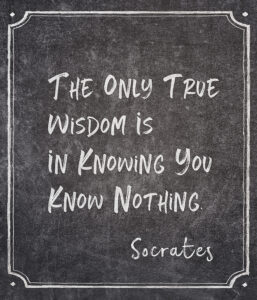
The only true wisdom is in knowing you know nothing – I know nothing about love
I know nothing about loveI’d been Catholic for just a few months when the young priest approached me in the empty church. Everyone had left after the morning Mass but I stayed on my knees staring at the crucifix.
The priest who would become my first spiritual director asked, “Are you okay?”
With tears in my eyes, I looked up at him and replied, “I know nothing about love.”
Somberly, Fr. Greg regarded me for a long moment. Then he nodded and walked away. That was over twenty years ago, but my conviction isn’t diminished. Rather, it’s amplified.
Yes, we know Aquinas defined love as willing the good of the other. And we know of His command: Love one another as I have loved you.
But yet there are times at Mass, or for just a moment when my thoughts turn to prayer.
Words fail when my heart seeks Him and a hummingbird appears out of nowhere.
Or I see a brand-new baby deer stumbling along in the effort to follow his mother.
Again I know I know nothing about love.
Part of my ignorance is language-based. English has just one word for love while Hebrew has nine and Aramaic, the language Jesus and disciples spoke, has 100 words for love.
As a young college student, I was privileged to be taught about the power of the vernacular by an expert: a Dominican nun. Therefore I learned early on that the choice of our words matter.
But when we look at the crucifixwe know there’s Something Else here. Something too immense for a human word. And yet, it’s all we have, isn’t it?
Perhaps like you, I’ve pondered this, off and on, ever since I converted to Catholic Christianity. This past week, I was given the means to frame the mystery of God’s love. In a splendid article on Ratzinger’s Gospel of Love, Conor Sweeny provides the perfect lens.
For me, it’s a pure WOWZA!
As he would explain in Introduction to Christianity, what makes Christianity unique is that “the God of faith is basically defined by the category of relationship” (147). This “corrects philosophy and lets us know that love is higher than pure thought.” It lets us know that God in himself is not thought thinking itself or the ground of sufficient reason but rather the eternal exchange of love.
This simple declaration of Pope Benedict: “this corrects philosophy and lets us know that love is higher than pure thought, warrants shouting from the rooftops.
Correcting Descartes, Nietzche, Kant, Hume, the long list of ‘enlightenment’ philosophers who were loved into being.
And I smile. And can’t stop it from morphing into a grin.
Because we’re not alone in this sea of darkness. No, there are more of us than we can ever imagine.
Doing our best, knowing it isn’t much.
And even when it all goes wrong,
He picks us up to try once more
We stand before the Lord with song
With nothing on our tongue but Hallelujah.
The post I Know Nothing About Love appeared first on Lin Wilder.
May 13, 2023
Commencement Addresses: Three to Consider

Smart dog in round glasses and an academic cap with a tassel on a gray background. commencement addresses: three to consider
Commencement Addresses: three to consider.
Speaking to young people virtually clutching their hopefully hard-earned diplomas requires more than a little preparation, thought and for some, prayer. Regardless of how frequently one addresses large groups, the invitation to offer counsel to young adults who no longer must pretend to be interested, calls for guts, clarity and relevence. None of which seems to be abundant in the public sphere.
But in these commencement addresses: three to consider, all three qualities abound.
Last year’s University of Pennsylvania’s address given by Ken Burns caught my attention because it was so packed with hope and a kind of desperate confidence in the young graduates he spoke to. This is one of his poignant comments to the Wharton graduating class of 2022 that warrants repeating-maybe a thousand times:
…, but our future as a democracy depends on you making things better. ‘A Republic, if you can keep it,’ as Franklin challenged us 235 years ago.
“Let me apologize.
“We’ve nearly broken this Republic of ours, but somehow you’ve got to fix it. You’re going to have to initiate a new movement, a new Union Army, that must be dedicated above all else—including your career and personal advancement—to the preservation of this country’s civic ideals. You’ll have to learn, and then re-teach the rest of us that equality—real equality—is the hallmark and birthright of ALL Americans. Thankfully, you will become a vanguard against the separatism that seems to have infected our ranks, a vanguard against those forces that, in the name of our great democracy, have managed to diminish it. I know you can do it. But it requires your civil—not cynical—energies…”
If you’d like to read Burns address in its entirety—a three-minute investment of your time, read more.
In case you’re not convinced of the need to listen to Burns’ splendid address, here’s one more reason:
…at this moment, on this memorable day for you, you sit here all potentiality and wonder. Franklin had only two years of elementary education. As his biographer H. W. Brands understood, schools teach you what you’re supposed to know, but also what you don’t have to know. “With Franklin,” Brands said, “he never knew what he didn’t have to know, so he assumed he had to know everything.” That’s the key to Franklin. He was always searching: Nature, art, society, politics, science, faith, himself, looking for ways to improve in all those arenas—especially himself, for he understood deeply and painfully that he was a mass of contradictions and limitations. Just like the rest of us.”
My online search for ‘the best,’ resulted in numerous lists
for the ten or twelve best graduation addresses ‘of all time.’ Despite the tiresome superlative, this second one is indeed excellent.
Actor Matthew McConaughey’s speech to the 2015 graduating class of the University of Houston ranks twelth on one list. Remember the actor’s acceptance speech of his Oscar for The Dallas Buyers Club?
I was riveted both by the film, and then again by that acceptance speech, So I was interested to read what he said to the 2015 UH graduating class. Here are just a couple of McConauhey’s remarks that so surpasses the expected that it’s considered one of the best motivational speeches.
He begins by stating, “The sooner that we become less impressed with our life, with our accomplishments, with our career, with whatever that prospect is in front of us, the sooner we become less impressed and more involved with that and these things, the sooner we get a whole lot better at doing it.”
And then moving to his ‘fifteen truths,’ the actor says, “life’s not easy…Life is not easy. It is not. Don’t try to make it that way. Life’s not fair. It never was, it isn’t now, and it won’t ever be. Do not fall into the trap, the entitlement trap of feeling like you’re a victim. You are not. Get over it and get on with it. And yes, most things are more rewarding when you break a sweat to get them back. Fact.”
Halfway through the forty-five talk is inserted advice about success. What it is and how you define it personally. Matthew McConaughey declares, “Continue to ask yourself that question. Now, your answer may change over time and that’s fine. But do yourself this favor. Whatever your answer is, don’t choose anything that will jeopardize your soul.” In case you’d like to read it, here. Or if you prefer the video:
Remember I promised three speeches?
Good, because it’s Harrison Butker’s that captivated me. Butker’s words are crystal-clear to the young people sitting precisely where he did just six years ago: Life isn’t about money, career, or success, it’s a mission. One we have been created to fulfill.
His remarks are common sense. Or were once.
“Get married and have a family “shocks”his listeners.
Have no idea who he is?
Until the Super Bowl, I didn’t either. But this twenty-seven-year-old’s exhortations about becoming a saint,-embracing the weirdness of Catholicism-have intrigued me. And it seems, the media.
Returning to his alma mater, Georgia Institute of Technology, Butker begins his remarks to the 2023 graduates:
I happen to be blessed by God at kicking a funny shaped ball between two yellow posts. So as someone who is not paid to speak for a living, I’m about to pop off with hard truths….I don’t care if you have a successful career, a big bank account…All of you are here because you are smart, hard working and capable people….but the world is filled with miserable smart, hard working and capable people…
Our culture is suffering…
We are living in a relatively safe society but make no mistake…we are at war…at war with truth.
Take a few minutes to listen to this message- it warrants your ten minutes:
The post Commencement Addresses: Three to Consider appeared first on Lin Wilder.
May 6, 2023
Faith and Its Razors Edge

Razor blade icon with blood. Sharp blade grey vector illustration isolated on white
Faith and its razors edge
Do you ever think you have it wired?
Lord, I’ve got this.
When suddenly, like a thunder bolt, you realize you’ve been arrogant and prideful?
See how special I am?
What important job (s) I’ve been given?
And then shockingly subdued, back on the knees, “Bless me Father, for I have sinned….”
They are gifts I know, these humilations. His infinite mercy in walking with me while I walk rapidly down the wrong road, boggles my mind.
On that point, of late I’ve been overwhelmed by books, podcasts, videos and articles, all of which look excellent but I only half-read.
Or promise myself I’ll read it later, then don’t.
We’re halfway through the Easter season-on the way to the joyous celebration of Pentecost-and I’m ever so grateful for the school that reminds me to maintain a Lenten attitude even during our feast days.
Huh?
Isn’t that more than a little depressing?
To the world, absolutely.
But, to us Christians, is it?
The reading for Thursday’s Gospel was St. Paul recalling St. John of the Baptist’s exhortation of who he was-and who he was not.
…John heralded his coming by proclaiming a baptism of repentance
to all the people of Israel;
and as John was completing his course, he would say,
‘What do you suppose that I am? I am not he.
Behold, one is coming after me;
I am not worthy to unfasten the sandals of his feet.'”
If the man who lived on locusts and honey in the desert while gathering the grace to proclaim Jesus’s coming, the man with the courage to publically admonish King Herod for his aldulterous marriage is unworthy, then where do we rank?
My need for a “school.”Very quickly after my conversion to Catholic Chrisitanity, I realized that I needed a school. Not that I phrased it that way back then, I just knew that I needed direction to guide me through the morass that was my new faith. Therefore when Judith, a psychiatrist friend of my husband John, invited me to come to a Regnum Christi meeting, I jumped at the chance. For the four years we lived in Connecticut, I relished the Regnum Christi formation and the holy women who befriended me.
But only after we moved to Nevada was I able to absorb the rule of Benedict: My School.
Since it’s May, we Oblates of St. Benedict begin anew with St. Benedict’s rule…with the Prologue. As is the case with all the Fathers of the Church, we could spend our lives dissecting the beauty, wisdom and love imbued in these stanzas. But it’s this section that cuts:
Let us arise, then, at last,
for the Scripture stirs us up, saying,
“Now is the hour for us to rise from sleep” (Rom. 18:11).
Let us open our eyes to the deifying light,
let us hear with attentive ears
the warning which the divine voice cries daily to us,
“Today if you hear His voice,
harden not your hearts” (Ps. 94:8).
Recognize St. Paul’s words? We read them during Lent from him and other prophets and apostles. The words function on several levels. Primarily though, to recommit to daily examination of conscience. And a warning to my aggressive, capricious, untrustworthy intellect. The immensity that is the deposit of faith, the splendor of the writings of those men and women who have gone before us is too vast for a single lifetime.
I am brought back to what I know, what I have come to believe.I must not complicate this faith and its razors edge.
Or watch long videos and exhortations.
Instead, simple focus on prayer, fasting, and almsgiving affirms the paradox of this pure unworthiness coupled with Sonship. This soul has been saved through Baptism, the Eucharist and confession.
And the Lord, seeking his laborer
in the multitude to whom He thus cries out,
says again,
“Who is the one who will have life,
and desires to see good days” (Ps. 33:13)?
And if, hearing Him, you answer,
“I am the one,”
God says to you,
“If you will have true and everlasting life,
keep your tongue from evil
and your lips that they speak no guile.
Turn away from evil and do good;
seek after peace and pursue it” (Ps. 33:14-15).
And when you have done these things,
My eyes shall be upon you
and My ears open to your prayers;
and before you call upon Me,
I will say to you,
‘Behold, here I am'” (Ps. 33:16; Is. 65:24; 58:9).
What can be sweeter to us, dear ones,
than this voice of the Lord inviting us?
Behold, in His loving kindness
the Lord shows us the way of life.
The post Faith and Its Razors Edge appeared first on Lin Wilder.



